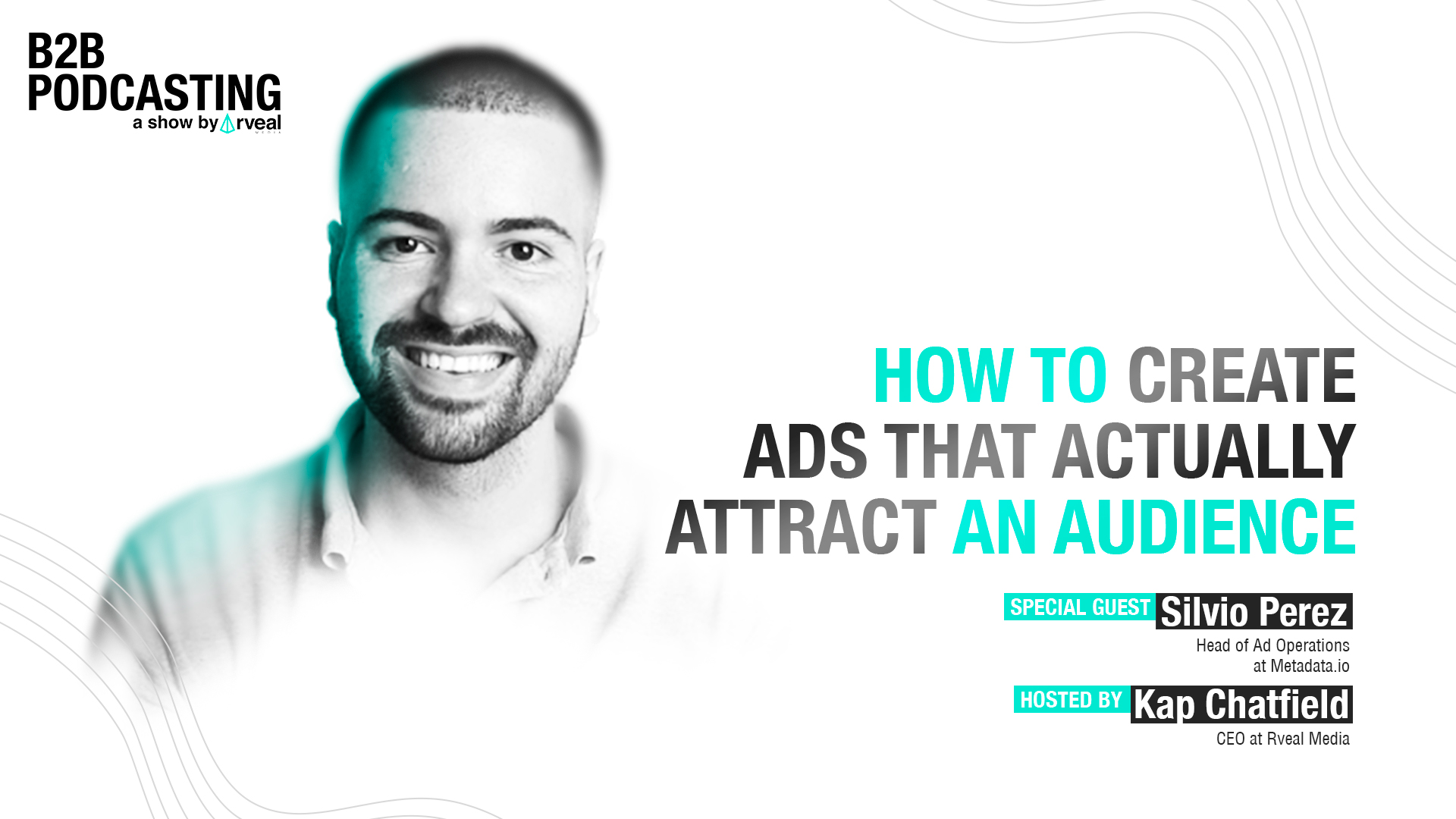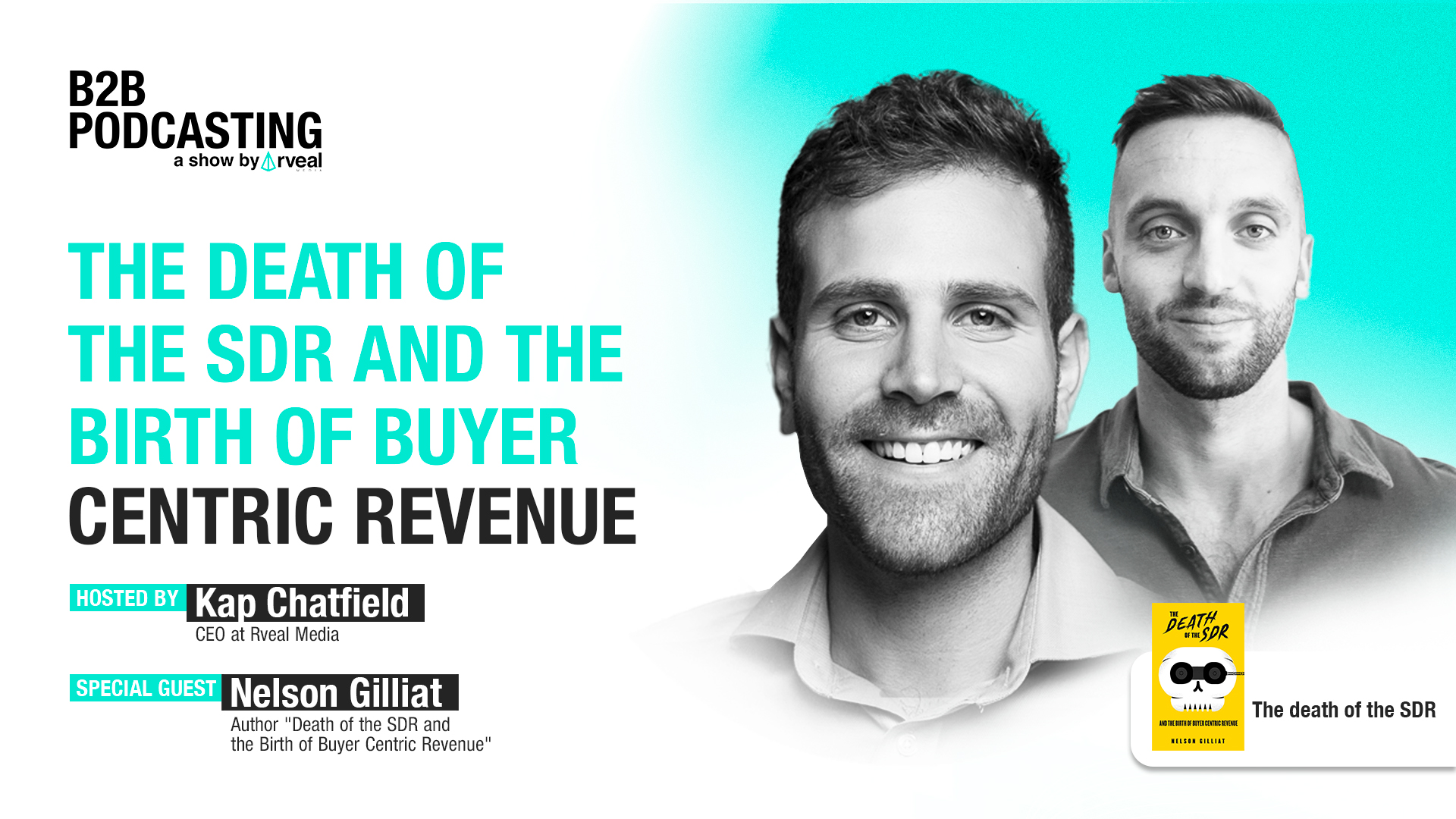How a Single Show is Transforming the World of HR - with Joe Sweeney
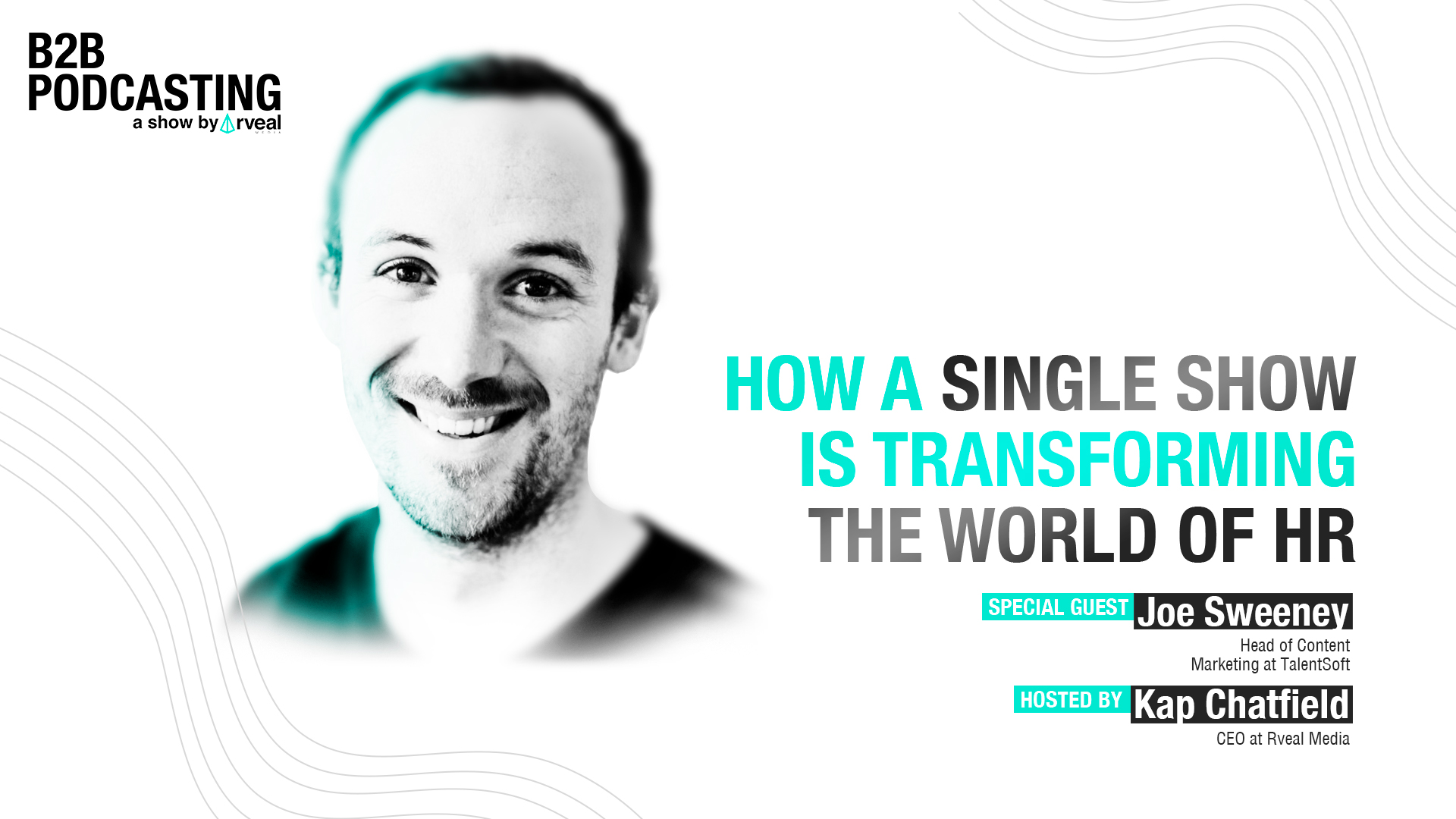
- Rveal’s website: rveal.media
- Rveal’s LinkedIn: https://www.linkedin.com/company/rvealmedia/
- Rveal’s YouTube channel: https://www.youtube.com/channel/UC69p14R2ccMdyUbbmdlWCEw
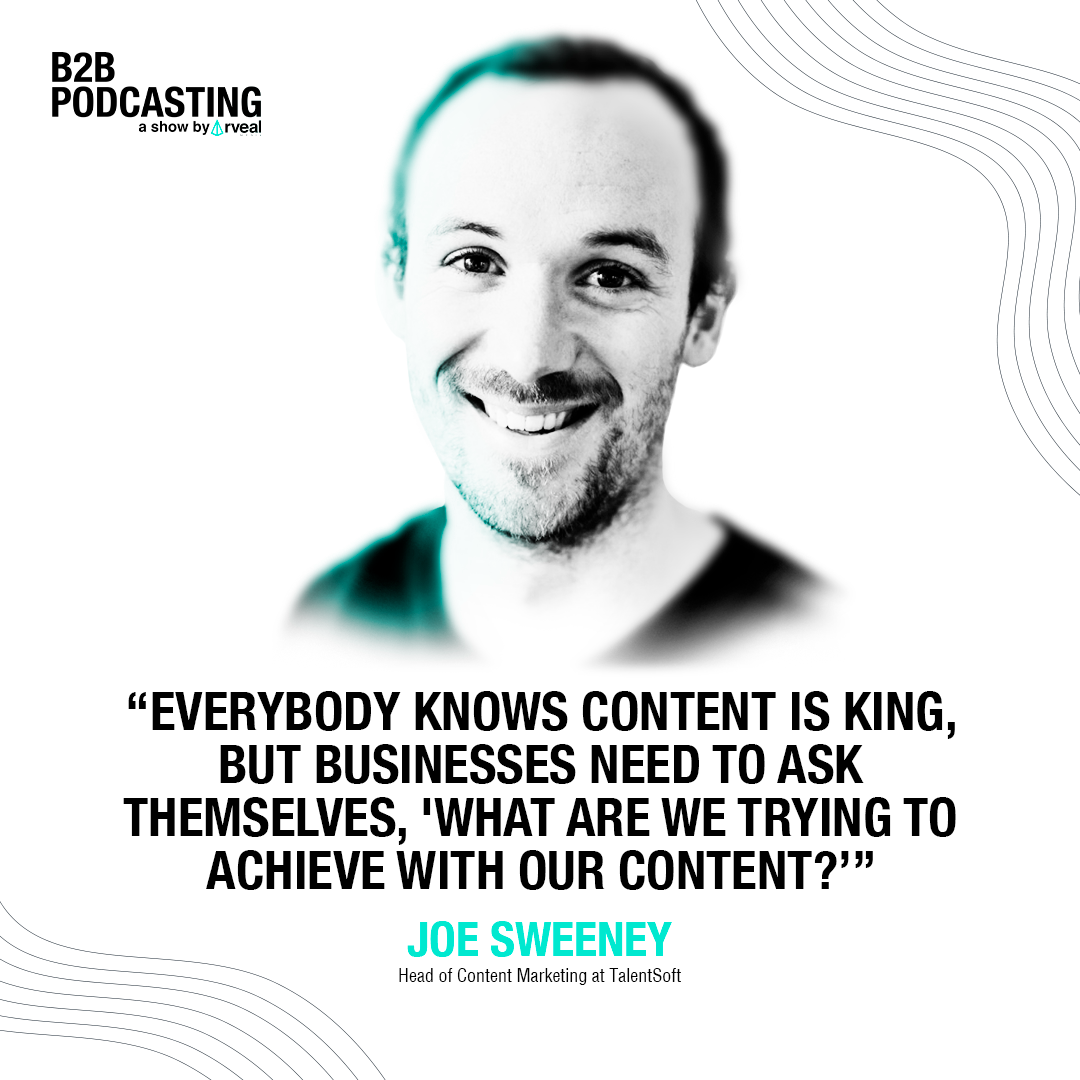
Full transcription:
Kap Chatfield 00:20
Hey gang, welcome back to B2B Podcasting, the show to help B2B CEOs, founders, sales leaders and marketers better understand how to skip ads and start being the show with their content so that they can grow their business. I'm your host, Kap Chatfield, CEO of Rveal Media. Today, our guest is Joe Sweeney. He's the head of content marketing at TalentSoft. And he's the co-host of The Ins and Outs of Work podcast, you can consume that wherever you consume your podcasts. But basically, he's in the world of content marketing for HR. He's quite the wizard at it. And we're super grateful to have you on the show today, Joe. Thanks for joining us.
Joe Sweeney 00:57
Yeah, thanks, Kap. Thanks so much for having me.
Kap Chatfield 00:59
So let's kick it off with just better understanding your world, what you're doing. Can so you work for TalentSoft. What is TalentSoft, what's the company do?
Joe Sweeney 01:09
Yes, so TalentSoft recently rebranded TalentSoft, a Cegid company, because we got acquired by a company called Cegid. And essentially, we have a SaaS platform for pretty much everything you can think of in HR. So from recruiting to performance management, to learning payroll now as well. Pretty much if you're wanting to do HR, well, TalentSoft is for you. So yeah.
Kap Chatfield 01:39
So you're doing content marketing for TalentSoft? What is your, what is your role look like specifically, in the world of telling the story? I mean, it's I think sometimes people can get caught up with, yeah, well do we really even have an interesting story to tell? Your role is really to try to educate the market about what you guys do. So give us an insight on the on the what your job looks like, for this organization?
Joe Sweeney 02:01
Yes, so I lead a team of four people, Kap and essentially, sit within the marketing team. So our marketing team has, you know, pretty decent size 35 odd people and across a whole range of different you know, disciplines. But content marketing, the way we really look at it, at TalentSoft is, you know, the way I've sort of framed it as kind of these two sides of the same coin. So one side is, is helping our lead gen teams and our marketing operations teams hit, hit the short term lead gen targets, and I think that's important. And, and, and, you know, you need to be delivering pipeline and business and we'd kind of I see us sort of coming alongside that. And, you know, with things like ebooks and other gated content, we do that on that side. But then the other side of the coin, and what I'm probably a lot more passionate or definitely a lot more passionate about is coming alongside and you know, our brand and bringing our brand to life. And I think that's what, that's what content can do today. You know, in b2b, it's like you have these brand messages, you have maybe a website homepage, but content is this ongoing conversation that you can create, to over time, over the years actually bring your brand to life in the minds of your, your audience. So that's how I kind of say it, two sides of the same coin.
Kap Chatfield 03:27
And it's so important today in the digital landscape, because customers are consuming content about your brand, before they ever interact with the sales rep typically. So having that content out there, consistently getting those touches, it's super important to so that you can kind of tell that story in like a residual or a passive way for that audience. I'm curious, as you're developing this content strategy and creating this content for TalentSoft, who is the audience? Like when you're thinking about that story, like who are they? What do they care about? And how do you position your story in such a way where it's like, this is a desirable piece of content for them to consume?
Joe Sweeney 04:07
Yeah, big questions Kap, but good questions. I think yeah, it's so important to start there to start with, you know, your who these people are. And for us that it can be anywhere from an HR director to an HR manager, even to IT a lot of times, sort of if we're talking mid funnel and and you know, when the decision goes to like a committee type thing. On the recruiting side, we can even be talking to like L&D people. So there's a variety of different roles there, I'd say. And in terms of how we really like how we really create content that that is interesting to them. I think it's a it's a serious journey. And I think what you've touched on there, Kap, is a great point, because as a content marketer, you know, I'm a marketer. I'm not an HR person. And so a lot of times what's interesting is that you're trying to speak to someone and bring value to someone who's not like you. And so that, as a as a marketer, takes takes a bit of thinking and takes takes taking your time to get your head into, into their world. And I think maybe I'm jumping the gun here. But podcasts, I think is a great way to do that. This is great, cool. Podcasts is an incredible way to do that because it gives you love this format, because it gives you an excuse to get in front of or talk to people who could one day become your customer, who are part of your audience. And you think about, you know, if I, if I wasn't running a podcast, or say my sales colleagues, either in any way, there's no way they can get that level of access to these people that I'm getting access to via podcasts. You know? It's been incredible running "the ins and outs of work" getting to talk to people like the Chief People Officer at Drift, for example. Being able to say, look, would you come on our podcast? And and pretty much nine times out of 10 the answer is "yes. Like, I'd be happy to do it". Because it's just it's an informal kind of chat. It's not, there's nothing salesy to it. So that's one reason why I love love the podcast. And going back to your question, that sense of like, getting to know your audience, and getting to know what's interesting to them, just by speaking to them, and then reverse engineering it back into into our content. It's been awesome.
Kap Chatfield 06:34
I love that. So you're really using it as a tool for your own show to better understand your customer to you know, I'm sure kind of mind, what problems are they actually facing? I mean, you you just admit it, I love this, that as a marketer, you're not the HR expert. But what you're doing is you're leveraging your show to better understand who is your customer? And what do they care about? And which becomes this, this flywheel of the content that you guys are creating as an organization? Am I right?
Joe Sweeney 07:04
Yeah, exactly right. And then, you know, I think looking back to when we started the podcast, even my knowledge of the space has come a long way, just through those conversations I've been able to have with those kinds of people, you know? I've kind of you know, you ask, asking them certain questions and then based on the feedback you get, or the answers you get, or you know, the energy that they bring to a certain topic, you kind of get a sense of what's those topics that are most interesting, where can we dive deeper. And then what I love about podcasts, and the reason I love it as a format, is that I don't think there's any other format that can be repurposed, in such, you know, in such a great way. Like, and that's, I think, the huge a huge thing in b2b marketing and b2b content, it's like, let's not try and reinvent the wheel. And you can quickly you know, you can quickly get lost in trying to do so many things all the time. But podcasting is this incredible way, especially if you've got video like, like you to oviously, of, I've taken that, that that content that episode, thinking about, it's so much more than just audio on an app, you know? It's it can be turned into video, it can be articles it can be, it can feed into ebooks that can feed into all sorts of things. And no, it's been a really cool journey so far.
Kap Chatfield 08:22
You guys are doing some really unique stuff with your show. I think one thing that I'm super impressed by with "the the ins and outs of work" is that it's very direct with who your audience is, it's not a vanilla show. It's like we know who we're speaking to, we know the content we want to create. We know the guests that we want to bring on the show. I think the formatting of the show is also really interesting. And some of the micro clips that I've seen, you guys even have this kind of countdown timer. And it's like, it's, you know, very rapid pace of, you know, topic covering, question answering. And so that's I think that's really unique, it actually feels more like a show or an experience than just sitting down and having a conversation. So why don't you break down for us the creative strategy behind the show, the formatting of it. Why do you guys do it the way that you do it?
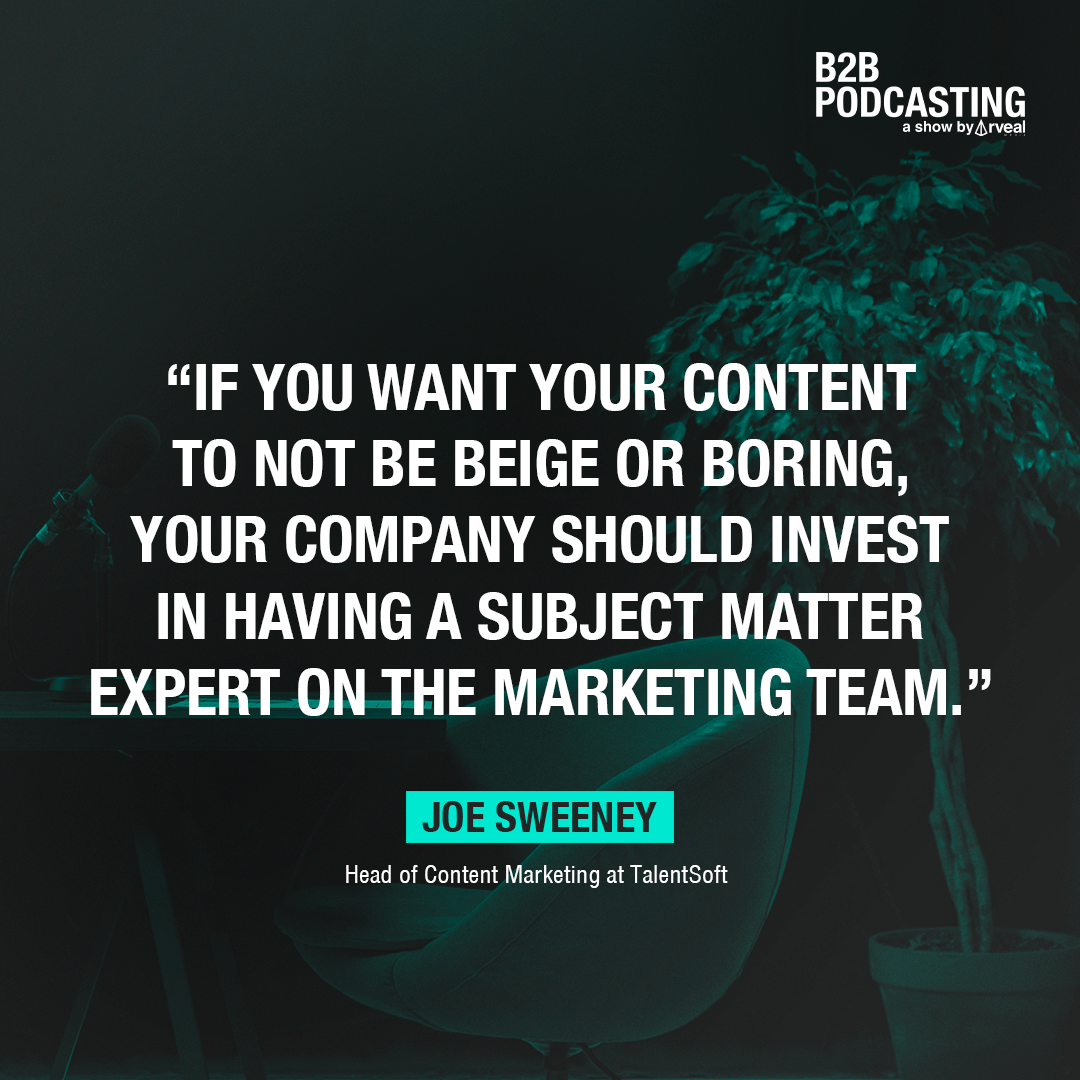
Joe Sweeney 09:11
Yeah, great question Kap. I think I think it's been really an iterative process for us and kind of think, you know, testing things and seeing what seeing what's working best seeing what we can do the best, even just qualitative feedback, like what are we getting the best comments from people about colleagues or, you know, people in our audience? And we've just tested and tried a lot of different things. And so they you're talking, you mentioned some some, some sort of segments that we've tried to bring into the show were one of them, for example, with that countdown timer was the thing called the outside outpouring. And probably what you need to know about our show as a whole is that we've really tried, like you said, to come up with a creative concept. So the reason it's called "the ins and outs of work" is that my co-host, Neelie, she is kind of an HR Insider. So she's a, she's a writer in the space, she knows the space intimately. And I'm definitely the outsider. So like we we've been talking about already. I don't know HR too well. But really the way we position the whole show is that, essentially, we were co host ones and insider ones, an outsider. And we kind of coming at these interviews with different experts from different angles. And so it's been a really cool way to explore a lot of things. Like, I'm kind of there to ask the stupid question a lot of times that, that, you know, an expert might not ask, but but it's not. It's been a really cool way. So what I think is so important to your question, just coming back to that is, is a sense that, especially podcasting, in a sense, like, it touches on social media as well, you're competing with, like, pretty much pure entertainment, right? So like someone scrolls, their podcast feed, this show this podcast, this shows that are entertainment, and you know, you're going to your show is going to show up alongside those shows, those podcasts. So I think it really needs to get seen, like podcasts needs to be seen, and marketing in general these days, as, as, you know, a space for entertainment in a sense, as well, but potential to entertainment, potential to education, but I think there needs to be something that's engaging about it. That's what I'm trying to say. And there's too much, you know, b2b marketing, it's got this sense of like, you know, as soon as it's b2b, for some reason, it becomes a bit more beige, and becomes a bit more boring. Because we like our beliefs
Kap Chatfield 11:43
Beige to boring, that's what b2b stands for. That's funny.
Joe Sweeney 11:47
Beige to boring. But I think, you know, and a lot of people say this now, but I don't think a lot of people execute on it. That actually, just speaking to people, who go to, you know, movies and go, watch whatever on TV, and like, they're just people at the end of the day. And just because it's a business topic, doesn't mean it can't be entertaining, as well. So this is what I think we've been trying to do a bit with the show with the podcast, as well as like, we had that segment with the countdown timer. It's called the outsider outpouring. So whatever the topic is, I'm the outsider. I take 30 seconds to just have a rant about, about the topic. And it just, I just go for it. And I just, you know, be a bit emotional about it. But it's just cool ways of trying to try to bring bring, you know, education and stuff to the topic. But in creative ways, I guess.
Kap Chatfield 12:35
A brilliant. I love that I we might take that tactic and apply it to our show in a way that fits our fits our audience and our message. So I'll I'll make sure to give you credit, the first time we do that, that's a really cool concept. I love what you guys are doing there. And I really love that you are leveraging both hosts to really speak to two different audiences. One's going to be the more expert level seasoned HR, you know, you know, person who understands that world a lot more. And then you come in, and you you kind of bridge the gap for someone who's maybe they're just getting into HR, maybe they're finding themselves like, "Oh, my goodness, I'm, I'm interested, I've actually just been hired by the startups to run HR, because I'm good with people. But I have really no idea what I'm doing, I don't know the terminology". You can help kind of bridge that gap. So very strategic way for you to help expand the spectrum of who your audience really is. I think that's, that's super smart. Now, I want to get back to kind of the business development strategy of it as well, because it sounds like you guys are using the show. Obviously, it's a it's a tool for you personally, to become more educated. It's probably a tool if I'm gathering what you guys are doing correctly, a tool for you guys to establish yourselves as experts or trusted leaders in this space in the world of HR. But it also sounds like you're trying to build strategic relationships with the featured guests that you have on your show. Now are these featured guests that sometimes you're like, "Man, this would be a really amazing person to work with. We'd love to do business with them at some point". Or just a person that we'd love to just kind of be associated with their network. What goes through your guys's minds as you're inviting new guests onto the show?
Joe Sweeney 14:19
Yeah, so I think it's really important to think strategically about who you are inviting on to the show, and I'd say a majority of the people we've invited on are people who could become customers in the future. But I think it's important to, you know, to almost have that back of mind, not front of mind when you're first doing that because I think the beauty of podcasting is that it is so non salesy, that people you know, you want to keep it as a as a format that that people feel free to share and people feel free to, you know, just be part of that experience without feeling that they're going to get sold to because, you know, a lot of companies do a lot of an actions with with a, with a very hidden, very just slightly hidden agenda that they're going to sell to you afterwards. I think people feel that. So we've tried to keep it really, you know, really non salesy and but definitely seeing the results of just building a community even on LinkedIn, for example of these people keeping in touch regularly. And it's an amazing yeah, like you said, it's an amazing way to network with people. And I think in in selecting, you know, in growing your show, and in selecting guests as well, it's important to really think about, you know, do these people, you know, maybe they have something to say, on your space, but does your audience overlap at all with their audience? I think that's a really good thing to be thinking about, especially when you're starting growing a podcast, because, you know, it does take time to grow, but any kind of overlap, you can get there. And kind of, I guess, insight you can get into into their audience and promotion on their audience is super important in the early days, I think.
Kap Chatfield 16:06
I think that's so important, especially if your goal is to keep it a very genuine, authentic feel where you're not just throwing in a featured guest to hopefully get a sale out of it, you have to think through, will this person coming onto our show, will it actually continue to build the brand of this show as a as a value generator for our target audience? So you got to have those things in mind. Clearly, that's what you guys are doing. I'm curious, in regards to content creation in general, I know that you guys aren't necessarily doing this for yourselves. As far as creating like an internal podcast, for the sake of developing culture. I mean, thinking about HR, we're thinking, you know, we're in a world right now, where the workplace is just shifting so much, especially after last year. You have hybrid workplaces, where somewhere in the office, some are remote. A lot of companies are fully remote. I'm curious to hear your thoughts, just from like a really from just a hypothetical standpoint? How can content creation at this level, perhaps even creating a show be useful in order to to help build culture and to boost team unity and company morale?
Joe Sweeney 17:18
Hmm, yeah, good point. Yeah, I think it's a great point there Kap that, you know, these are, these are literally the topics we've been exploring with our guests is how work is changing. And having done the show for, you know, a year or so now. It's like, I don't know, if there's, you know, we're living in a moment right now, where work is changing so much, and you brought up hybrid work there and remote work, and different things. And so I think, yeah, I think content is like, is super crucial, even if I think we've touched in here on speaking internally, and communicating internally within companies. And given what's happened during the pandemic, and hybrid work and remote communication is such a, you know, a strategic thing now. And, and the ability to communicate in a clear way, in a way that has gets everyone on the same page. Even when, you know, some people are in the office, some people are not in the office. And and I guess what you call show marketing, even as an internal communications exercise could be super valuable. Like having, I think part of it is having a regular and consistent touch point, even within your company, of people being able to, to know where to go to, to, to find out what's going on or to get updated. And I can see that as super valuable. Yeah.
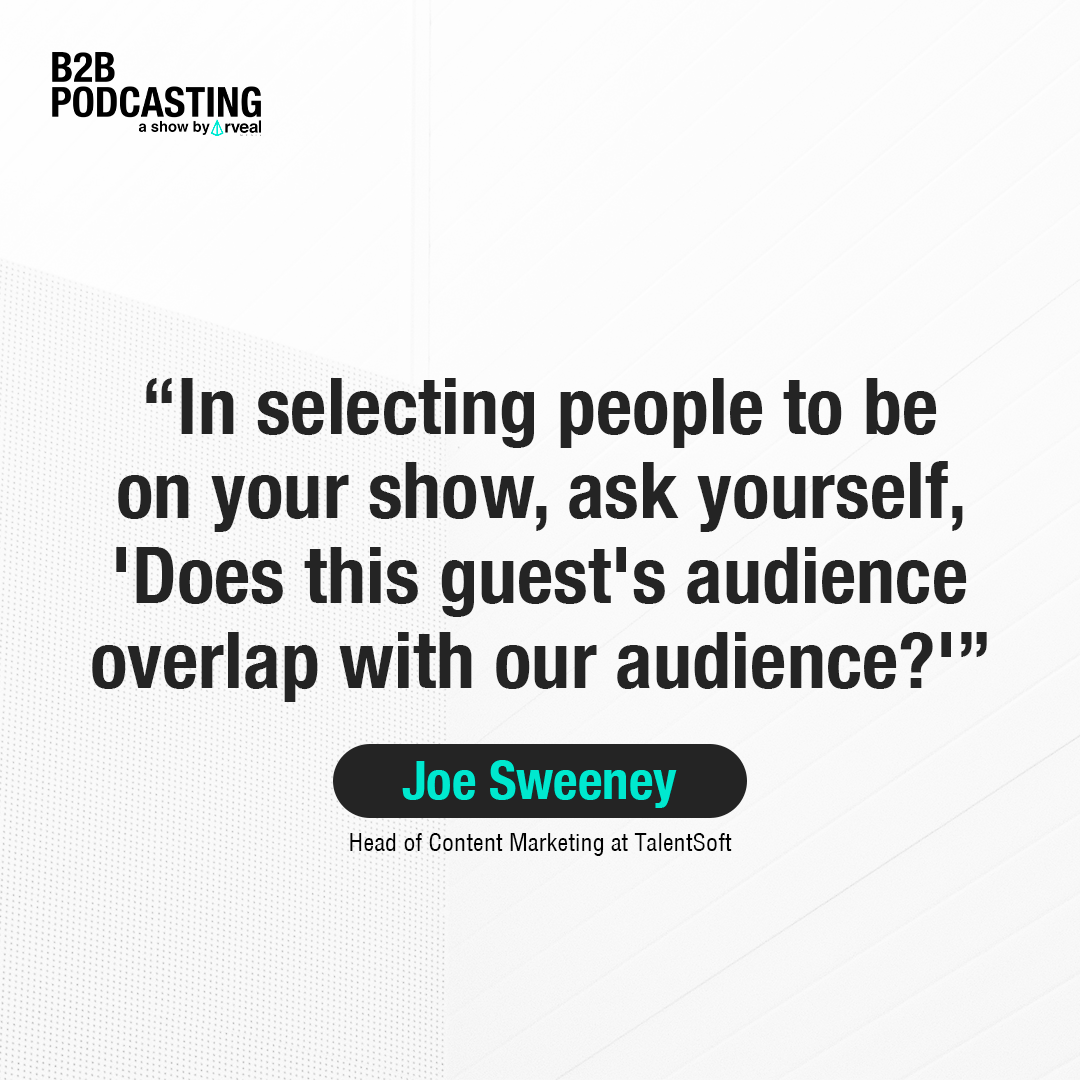
Kap Chatfield 18:48
I think so too, I think about in today's day and age, to keep people unified, you know, you know. For example, with your show, what you're doing is you're creating a narrative, you're creating an expectation for your audience where they know, every episode, I'm going to get this sort of experience, I'm going to grow in this way as this person. And we all find ourselves like, we're all the main character of our story, we're just kind of hardwired that way. And creating a cont a show an episodic content flywheel like you guys have, what you're doing is you're giving that audience that persona, that main character, a narrative that they can read the script of, so to speak, whether it's once a week, twice a week, once a month, but it allows them to like kind of be reminded of the character that they play and the narrative of being in HR or whatever. And that can be really helpful that can provide a lot of value. And so my, I think, to be able to do that within an organization is there's a lot of opportunity there, especially as teams are trying to continue to build that unity remotely.
Joe Sweeney 19:55
Yeah, totally. And I think one of the one of the strengths of podcasting as well as is that it, you know, kind of hardwired into the format, there's this sense of consistency and the sense of, like you're talking about it as a show. It's like, you know when you go back there each week, or however often episodes are published, you kind of get, as you start to follow it, you know what to expect, you know, the kind of experience you're going to have. And so if we're talking internal comms, internal communications, I think, I think that's so important in companies today is the sense of like, as an employee, what, you know, what's next week going to look like and what are even some of those touch points or some of those experiences that I can lean into as an employee in my company? And a show or a podcast could be a great way of doing that. And like, just giving people a framework of like, okay, "I don't necessarily know what's going on right now but I know where to go for information, or I know, when the information's gonna come to me through a format like that, if that makes sense.
Kap Chatfield 21:01
Yeah, absolutely. The consistency of communication, and being concise and clear and on message and showing up on a regular basis. I think it's critical, I think that's, that's what's really going to keep people engaged in the vision of an organization. So you and I are on the same page, I think show marketing, you know, not just for external purposes, for thought leadership, brand building, but also for internal purposes, keeping people on the same page. It's extremely powerful, but I am yeah, I am fascinated with what you guys are doing because clearly, as a as an HR software company, you guys are you're educating the market, you're kind of putting a flag in the ground showing that that you guys exist, and that your company does bring value to this area. I'm curious, I know that you've only been doing this for maybe about half a year now as a show. But I'm sure that it's it's contributed to the growth of your business or your brand in some way. Could you, could you share with us some of the results, whether qualitative, or even quantitative, if you have them about how the show has contributed to helping TalentSoft get its name out there?
Joe Sweeney 22:07
Yeah. So. So I think when you when you say to your boss, I want to start a podcast, this is probably the first question that you're going to get, as a marketer is kind of like, "okay, but what's the ROI? And like, how do we measure if it's being successful?" You know? And I think I think with podcasting, there can be, you know, it's a, it's a kind of a tough question, in some ways, but in other ways, it's not at all the tough question. And the way I really approached this question, when we were putting together the business case, was to say, you know, this, I really presented it as the foundation of our whole content strategy, right? So, so it's not just another thing we do, you know, alongside other things, it's actually a foundational thing. And so, as I was talking about earlier, if we're talking about the ROI of the podcast, actually, we should just be talking about the ROI of our whole content strategy, in a sense, because it is the foundation of that whole thing. Mike drop.
Kap Chatfield 23:11
Yes, that's a mic drop. That's great
Joe Sweeney 23:14
That's a Mic drop. Thanks, Kap, that's a mic drop. And so I think, yeah, what what I really position, the position today is is not like, "Sure, let's track the downloads". But if you if you position it as just a podcast, or just a channel, people are going to say, "Oh, how many downloads have we got?" And after six months, a year, if we don't have enough, we'll probably be cancelled. Whereas I have no worries that we're going to, you know, be able to continue it from the business point of view. Because I know that, you know, we're, we're delivering content by ebooks, or checklists, or other things that are delivering enough leads to the business and that's all going well. And actually, all that content, a lot of that content anyway, is coming from the podcast. And so having these expert conversations with, like, the Chief People Officer at Drift, with different analysts, and, and people that, you know, I'm bringing so much expertise into the thing. It's actually feeding our whole content strategy. So so I don't necessarily have to have that conversation of how many downloads are we having? How, you know, people like how many subscribers have we got? And all this stuff, and it's been really freeing in that sense. And sure like, downloads are growing and all that, but it's not my main focus.
Kap Chatfield 24:30
That's so great. That's so freeing too, because I think marketers, we kind of have this, like, our feet are to the fire, so to speak, like we got to prove the worthiness of our existence all the time with the work that we do. But what you're showing is that by creating the show, it's really as you mentioned, it's the foundation. It's the flywheel for all the valuable content that doesn't just serve marketing purposes, I believe and I've seen that with him within our own organization. I've seen it with our own clients and other people we've had on the show. The content also serves the sales side as well. So I'm not sure if you guys are actually leveraging this for your sales team, but hypothetically, how could you see the content that is used from your show, or just shows in general, how could that benefit not just the marketing team, but the sales team?
Joe Sweeney 25:13
Yeah, well, I think, you know, we've had good feedback from the sales team in terms of the, you know, those kinds of non salesy conversations and even them getting to listen into to, you know, what these people are interested in. And I guess, just, it comes back to what I was saying before about having, you know, being able to get these people on a call and ask them a whole series of questions and, you know, feed in different things that we what we might want to know, as marketers or salespeople, but in a setting that is not at all salesy. And so, so for a salesperson, it's, it's amazing in terms in terms of getting to listen to, you know, people who are your dream customers in a lot in a lot of ways. And, and if we do the interviews right, you know, getting some feedback that potentially interesting for for a sales conversation in the future. So,
Kap Chatfield 26:08
I love that you guys are doing a show that I've seen some other shows regarding kind of like HR company culture, things like that. What made you guys feel like your show needed to be added to the, you know, the the show list on Spotify or Apple podcasts? Why? What was missing that you guys felt like you needed to bring to the table with The Ins and Outs of Work?
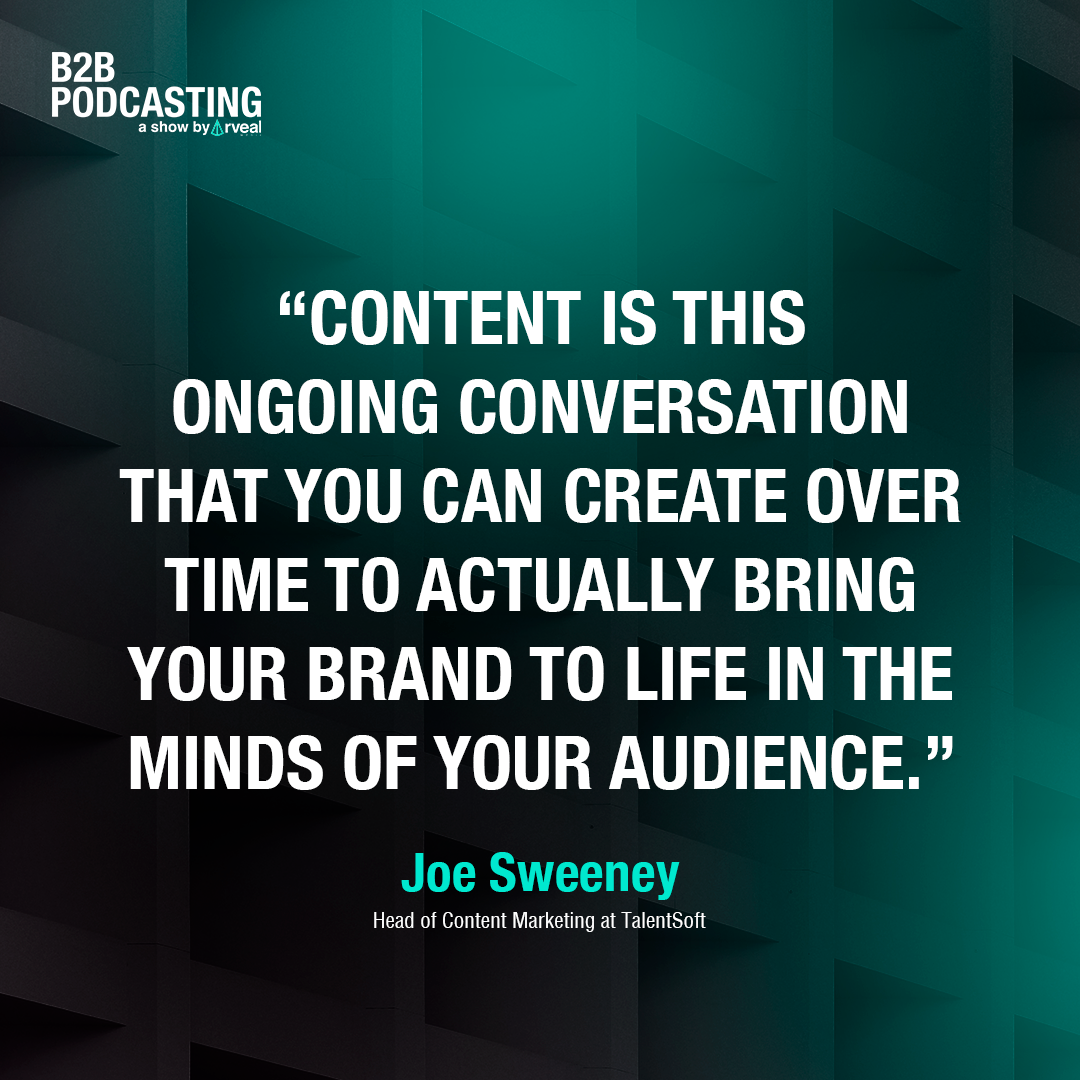
Joe Sweeney 26:32
Yeah, I think I think for us, it's just, it was just an interesting time to be in HR as a marketer, like, I mean, I joined this company, September 2020. And so, you know, we all know what's happened the last couple of years in the world of work, and, and HR is a space that's just really been disrupted a huge amount. And a lot of these trends that maybe have been happening for a while, have kind of like, been fast forwarded, because of COVID. Like, you talked about hybrid and remote work and different things like that. And so I guess what we feel our show brings to the table is like, is this new perspective and kind of, that's where we bring that inside and outside view of saying like, okay, COVID just happened, the world's crazy right now. What, uh, you know, if I had to summarize our whole show, it's like, what are all those things that a, as HR people, we thought we knew for sure, that we need to come back and revisit and actually rethink? And, and that's where as an outsider I can bring kind of like, the dumb question that we actually maybe is not so dumb anymore, because we need to, like rethink that whole thing. So. And that's where I think coming back to your question as well. I think we, we felt that if we were starting a podcast, we were starting a show, we needed to have a really clear point of view on specific things. And I think that's actually a that's actually a topic for content marketing as a whole. I think as you know, you can talk about a lot of different topics, and you know, depending on what your product does, and whatever, and that's great. But the real strength of it. And the hook to that is having a unique point of view on whatever space you're in, you know? So, and when I think about the best content marketing, it's like, you know, they're not just, they're not just writing SEO articles and targeting specific keywords just to rank and search. But you know, maybe that's part of it. But it's also, what is your unique point of view on that space? So for us in HR, it's like that whole sense of like, we need to rethink a lot of what's happening and what's been done, because the world of work is changing so much.
Kap Chatfield 28:53
That's so important, because in your world, I mean, you get it as a content marketer. Sometimes content marketing could just feel so repetitive, like it's I've heard people use the words like, it's SEO, keyword soup, a lot of time, it's just the same stuff said over and over and over again. But it's not actually providing any unique insight. But for you guys, it was like, hey, we want to not just create content that is like, you know, what everyone's heard before. But we want to provide a unique and refreshing and helpful perspective for our target audience, which also just happens to match our customer profile.
Joe Sweeney 29:31
Yeah, if you scroll the internet these days, like everyone knows they have to be doing content. You talk to any b2b company, they know content is king, right? Content is king. But I think a lot of what a lot of people don't realize is why they're doing it, like because everyone else is doing it, sure you should be doing it. But why are you really doing it? Like, what are you trying to achieve with your content? And I think that's where the point of view comes, comes across because, since everyone knows they need to be doing it, there's a lot of like you're saying this beige. It's the same stuff, regurgitated every time. So I think the people that are winning and doing content marketing well, and doing podcasts and shows well, are ones that can bring a new lens to something and a new view on something. And one thing I just wanted to mention in the way we do it as well, and part of our content team, actually, my co host Neelie, she, she is essentially employed by us to be a speaker, and basically to be an HR expert, and she sits within the content marketing team. And that's been such a powerful resource, because she knows the space so well. And so we're not just relying on our own internet research, or like, hassling people in the company who have their own jobs in a busy day to day to, you know, to help us create content, but like, we can really lean on her to bring like something a bit differentiated and something a different view to our content. So that's been super helpful.
Kap Chatfield 31:11
That's brilliant. She's like the HR specialist that helps make sure that the content you guys are producing is actually truly thought leadership, and not just vanilla content that could be consumed anywhere. That's brilliant. I think more. I'd say that a lot more seriously.
Joe Sweeney 31:29
Yeah, totally, I'd say that's what a lot of content teams miss, right? And before having this role, I think back to how I was working before and like, in reality, a lot of it would come out of my head, you know, like, and I'm not an expert in that space. So it's a bit scary, in a sense being like, this shouldn't be coming, this shouldn't be coming out of my head, or my research. But I think a lot of times in content marketing, that kind of is what happens.
Kap Chatfield 31:58
Couldn't agree more and man, you're making me think about how we can help our clients better with just finding like the subject matter expert, and really making them part of the marketing team, whether it's someone that they hire from the outside, bring them in, or the CEO, or the founder or the innovator, the the chief Innovator of the company. So super valuable stuff. Joe, we're coming to the end of our episode now. And I'm just super grateful that you'd take the time to help explain what you guys are doing with your show The Ins and Outs of Work. We're going to put the link for that show in the show notes. We're also going to put the link for Joe Sweeney's LinkedIn profile, make sure you connect with him and follow him there. But Joe, just last thoughts, what would you, I would love for you to share with the audience is like have some final words. For people that are in this place of man, I really am seeing conceptually the power of doing a video podcast or doing a show to develop and distribute expertise or to build a brand or to build strategic relationships. But I'm hesitant. I'm hesitant to get started, I feel like we're there's no way we can produce it at the production level that you guys are because you guys are doing at a really high caliber. What would you say to just help that person or that CEO or b2b brand leader kind of cross that threshold?
Joe Sweeney 33:10
Yeah, it's a good point in terms of like the production value Kap, because I think that can be something that really holds people back before they start. And if you wanted to, you could scroll back to season one of our podcasts, the first few episodes, and the production value is not where it is today. And I think that's like, at the end of the day, I think people don't care as much as you think they do about production value, I think they're really looking for the content. And a lot of times, that's what's great about podcasts, as well as like, you can ramp it up. And you can improve over time. But don't let it stop you from starting, I'd say and you can get a cheap set up and you can do a great job. And it's really that point of view and the ideas, I'd say that are most important to get started. And probably just the last kind of a last kind of piece of advice would be just think about it so much. Think about it as so much more than just audio on podcast apps, right? Because I think when we say podcast, and I'd like to, you know, that's I think why you say show because it's such it's such a better way of describing what this is because when you say podcasts, a lot of people say okay, yeah, it's gonna be on Apple, Apple podcasts, whatever. And people will listen to it on their commute. But it's so much more than that. If it's a show then it's a video and then it can be repurposed. You know, like I've been talking about this whole time, it can be repurposed into blog articles and literally any kind of content you can think of under the sun. Think about it as your foundation so much more than just audio.
Kap Chatfield 34:43
Brilliant Joe, man just so grateful that you would share that on the on the show today. Guys, as I mentioned, the links for his show, his LinkedIn profile are going to be in the show notes of this episode. Make sure to check it out. Make sure to follow him. Joe couldn't be more, couldn't express my gratitude more to have you you on the show today. Thanks for jumping on.
Joe Sweeney 35:01
Thanks Kap, it's a pleasure. Thanks for having me.

